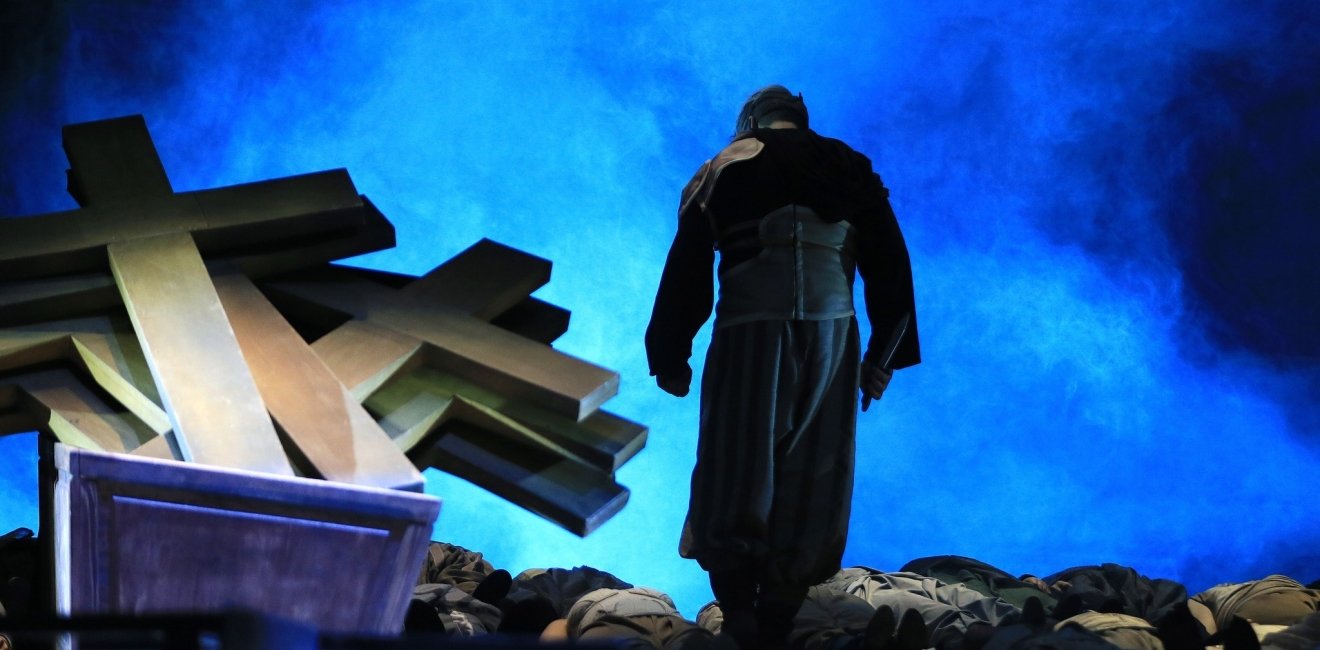
A blog of the Kennan Institute
One recent Sunday evening, November 13, the Lviv National Opera presented the world premiere of Yevhen Stankovych’s three-act opera, The Terrible Revenge (Strashna Pomstva) to mark the composer’s 80th birthday. There would be nothing particularly noteworthy about such a production at another time. But the premier of a large-scale new work at a time of war merits special attention. Lviv thus far has been spared the widespread disruptions of electricity and water confronting Ukrainian cities to the east, but it has endured bombing attacks and other wartime disruptions. The Lviv National Opera’s pursuit of a full season constitutes a powerful rebuke to the Russian invasion.
Russians honor Mykola (Nikolai) Gogol as a founder of the Russian literary tradition and arguably the first Russian-language realist writer; Ukrainians honor his strong ties with Ukrainian themes and folklore. Throughout his life, Gogol returned often to the Ukrainian folklore he heard growing up in the town of Nizhyn. His earliest works, such as the stories contained in the Dikanka collection and his massive Taras Bulba based on the history of the Zaporozhian Cossacks, reveal a profound connection to Ukrainian legends.
Gogol’s short story “The Terrible Revenge” (better known in English as “A Terrible Vengeance”) is among his earliest works, written when he was in his 20s. Included in his first collection of short stories, Evenings on a Farm Near Dikanka (1832), the tale transplants German mythology to the Ukrainian steppes. The arrival of two holy icons at a Cossack wedding transforms a stranger into a sorcerer, who disappears. The bride Katerina turns mad after her father shoots her new husband Danilo in the arm. The sorcerer returns to bring Katerina back to sanity so that she can marry. He ends up killing her with the knife that she pulls to drive him away. The themes of revenge in the story speak directly to the passions of war, especially now. Clouds part to reveal Crimea, the Carpathians, and a hulking knight riding down to smite the sorcerer. The story ends with the corpses of ancestors waiting to devour the sorcerer’s body throughout eternity. The new opera highlights the story’s inherent mysticism with lively—and at times bloody—action. The story has been made into plays and films is well suited for grand opera.
Now 80, Yevhen Stankovych was born in what is today the city of Svaliava in western Ukraine. He studied composition with the Polish composer Adam Soltys at the Lviv Conservatory before moving to Kyiv to study with Ukrainian composers Borys Lyatoshynsky and Myroslav Skoryk at the conservatory there. He eventually taught at the Kyiv Conservatory and served as a chair of the National Union of Composers of Ukraine. He has composed 12 symphonies, five ballets, concertos, film scores, chamber music, and now an opera.
Andreas Weirich directed this Ukrainian-German coproduction, with Anna Schöttl designing the sets, Serhyi Naenko choreographing the action, and Volodymyr Sirenko and Ivan Cherednichenko conducting the music. The opportunity to conduct this premiere had special meaning for Cherednichenko, whose parents were killed by Russian soldiers in Irpin.
The leading roles are played by soprano Daria Litovchenko, bass Taras Berezhansky (known for his powerful performances of Attila), Latvian tenor Roman Trohimuk, and up-and-coming soprano Marianna Tsvetinska. Several of the singers returned from the front to perform.
In accordance with wartime protocols, the audience is limited to the capacity of the theater’s bomb shelter. The Ukrainian Armed Forces embraced this production, which received financial support from Ukraine’s Stabilization Fund. Should air raid sirens sound for an hour or less, the performance will continue.
The premier proved a fantastic success. The audience’s enthusiasm extended beyond simply being able to attend a full-scale live opera after the restrictions imposed by COVID and then war. Social media posts from audience members praised the performances and its score highly. A Terrible Revenge will enter into the company’s repertoire.
As noted in my blog post last May, the Lviv National Opera has been committed to mounting a full season of works. This ambitious premier captures an idea expressed by Gogol in an 1848 letter: “it’s not my job to preach a sermon. Art is anyhow a homily. My job is to speak in living images, not in arguments. I must exhibit life full-face, not discuss life.” Audiences attending the Lviv National Opera during this remarkable season are viewing life full-face.
The opinions expressed in this article are those solely of the author and do not reflect the views of the Kennan Institute.
Author

Former Wilson Center Vice President for Programs (2014-2017); Director of the Comparative Urban Studies Program/Urban Sustainability Laboratory (1992-2017); Director of the Kennan Institute for Advanced Russian Studies (1989-2012) and Director of the Program on Global Sustainability and Resilience (2012-2014)

Kennan Institute
After more than 50 years as a vital part of the Wilson Center legacy, the Kennan Institute has become an independent think tank. You can find the current website for the Kennan Institute at kennaninstitute.org. Please look for future announcements about partnership activities between the Wilson Center and the Kennan Institute at Wilson Center Press Room. The Kennan Institute is the premier US center for advanced research on Eurasia and the oldest and largest regional program at the Woodrow Wilson International Center for Scholars. The Kennan Institute is committed to improving American understanding of Russia, Ukraine, Central Asia, the South Caucasus, and the surrounding region through research and exchange. Read more

Explore More in Focus Ukraine
Browse Focus Ukraine
Talking to the Dead to Heal the Living

Ukrainian Issue in Polish Elections


